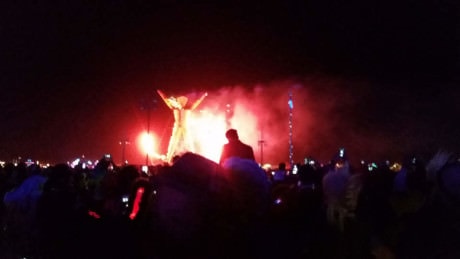The mission of AWol (A Way of Life) Productions is to “share the values of communities by collaborating, creating, and telling stories of the performing arts.” Its current production fulfills this mission by allowing “burners” (In this case, broadly conceived as anyone with a direct, regional, or thematic connection to the Burning Man festival) to tell their stories, in a changing menu of confessionals, anecdotes, and participatory revelations. The concept makes for a pleasant and reflective evening of theatre, if one that serves a very particular kind of audience.
One burner tells of how her relationship ended on Thursday of the festival, and how her despair was somehow relieved by the absurdity of seeing a burner dressed in a Borat-style jumpsuit hip thrust in her direction from atop an art car. Another tells of energy exchanges with dear friends and the resonating spiritual enlightenment that came from it. Others share how the Playa burn, or one of its regional manifestations (Transformus in North Carolina, for example), aided a burner’s drug recovery, opened another’s mind to alternative attitudes toward art, or helped still another embrace failure as a working principle.
Because different burners attend different shows, traditional rehearsal polish does not apply. The speakers are true believers sharing their stories. The stories are rich with personal insight, humor, and pain, with compelling discussions of sexuality, drugs, art, and spirituality. Granted, the forum allows for little consistency in the variety of styles. Some dive into self-contained emotional memories; others use more conventional rhetorical styles. TD Smith uses the language of danger, failure, and consumption (“The desert eats … “) to share his story of an ill-fated, and potentially deadly, attempt to raise a burn structure with a faulty hinge. David Fabian uses self-deprecating humor to share the emotional struggles and confusions of managing the Playa “bathhouse.” Chelsea Dobert-Kehn dives into her memory of evolving from an incredulous attitude toward the burn to a embracing the spirit.
Between the stories, the spectators are invited to share their names (and burn names if they have them) and recite one of the principles of Burning Man. It is this structure that ensures that the audience feels some sense of the radical participatory nature of a burn. That said, one cannot help also wondering if the commercial performances of the Capital Fringe are the most appropriate environment for what reads like Burner church, with burners bearing their testimonies of how this spiritual/cultural event has changed them. To this reviewer (a sometime burner and participant in the radical performance art scene), it feels out of place; this performance belongs either at a burn, or in the open air, amid the presence of the very nature and community to which burners are drawn.
Running Time: 95 minutes.
10 Principles )’( plays through July 24, 2015 at Tree House Lounge – 1006 Florida Avenue, NE, in Washington, DC. For more information and to purchase tickets, go to their Capital Fringe Page. There is a 10 PM performance on July 26, 2015 at The Argonaut -1433 H Street NE, Washington, DC.





